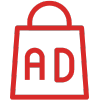What is PPC? ______
Pay-Per-Click (PPC) advertising is a digital marketing model in which advertisers pay a fee each time one of their ads is clicked. Essentially, it's a way of buying visits to your site, rather than attempting to "earn" those visits organically. PPC is most commonly associated with search engine advertising, such as Google Ads, where advertisers bid on keywords related to their target market and audience.
When someone searches for a keyword related to the advertiser's product or service, their ad may appear at the top of the search results. The advertiser pays a small fee for each click on the ad, leading potential customers to their website. The cost per click (CPC) varies based on the competitiveness of the keyword and the quality of the ad.







